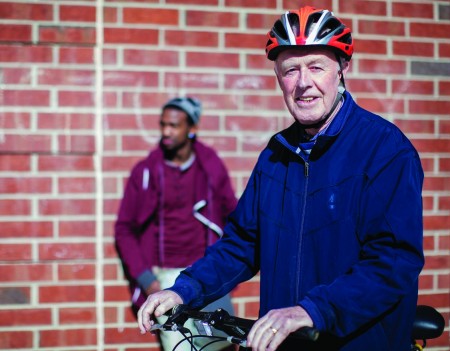Customer service representative Charles Dunne takes extra initiative to serve patrons at Southside
As his face greets the brisk morning air, Charles Dunne wheels out his 4-speed mountain bicycle.
Dressed in dark navy slacks, black dress shoes and a thick jacket, Charles straps a plastic helmet atop his head. He takes a deep breath and prolongs his exhale.
Then he’s off. Cycling four miles up and down the moderate hills of Fairfax, Dunne coasts onto Mason’s campus. Parking his bike outside Southside, Dunne is now ready to ride the day as Mason Dining’s customer service representative.
The line for Southside is backed up three feet to the elevator for lunch at noon. The slow, mundane shuffling of anxious feet harmonizes with the chatter of students engaged in various conversation.
James K. Conant, a professor of Public and International Affairs, heads straight to the salad bar after entering the campus’ all-you- can-eat dining hall.
He crafts a salad of mixed greens, small vegetables and ranch dressing.
Next, he ladles noodle soup into a dull green ceramic bowl and retires to a booth near the back of the hall. Upon sitting, Conant realizes he forgot silverware. He finds a fork for his salad and a spoon for his soup.
Conant returns to his seat, ready to enjoy his lunch. As he attempts to eat his soup, he notices not much soup can fit in the spoon, and eating it suddenly becomes tedious.
That’s when Conant approached Dunne.
“It’s very hard to eat soup with a tablespoon and not a soup spoon,” Conant said. “So Charles went to bat for me.”
Dunne immediately abandoned his post at the cash register and began circling the hall in search of soup spoons at every station.
No soup spoons by PastAmore.
No soup spoons by Changing Colors. No soup spoons by Wrapped Up. Charles was puzzled by the sudden disappearance and was compelled to approach Southside Manager Mark Arnold about the issue.
“It took a while to make it all happen, but the soup spoons reappeared,” Conant said. “It makes me feel better every time I come here because I know somebody is looking out for the customer.”
Dunne has maintained friendly connections with faculty, staff, and students during his six years at Mason because of his willingness to help.
As the customer service representative, he is the link between the customers and Sodexo, the company that runs Mason Dining. Many students know Charles by first name, and he makes a conscious effort to reciprocate the gesture because of a lesson he learned while taking courses at Dale Carnegie, a company that helps further develop communication and leadership skills.
Before Dunne and his wife immigrated to the U.S. from Ireland in 1967, he worked in England. Throughout the two years he worked there, he was known as Pat.
In England, it’s common for Irishmen to be generalized as Pat because Patrick is a common Irish name. Dunne, however, found it insensitive. Then, on the first night of classes at Dale Carnegie, Dunne’s instructor said something that changed him forever.
“The most important thing you have is your name,” the instructor said.
Dunne couldn’t get over that idea. He recalls his dislike for being called Pat and has since been dutiful in remembering people’s names. On a daily basis, Dunne interacts with 800-1,000 people in Southside during his shift from 10 a.m. to 4 p.m. Dunne says his six years at Mason have been a delight, mostly because of the students.
He meets students fresh out of high school and watches them grow into mature, intel- ligent young adults. Dunne’s adoration for Mason and his job is just one reason why Arnold calls Dunne a wonderful man.
According to Arnold, Dunne takes time every day to walk around Southside and ask people how their day is. With a contagious grin and red glowing cheeks, Dunne radiates happiness toward people and offers sincere interest in everyone. Dunne’s secret to being consistently happy at work is a disciplined mind.
“I’ve learned that when I get off my bicycle, I’m going to leave all my problems at home, and I’m going to go in with a good attitude,” Dunne says. “Since coming to George Mason, I’ve learned that.”







Comments